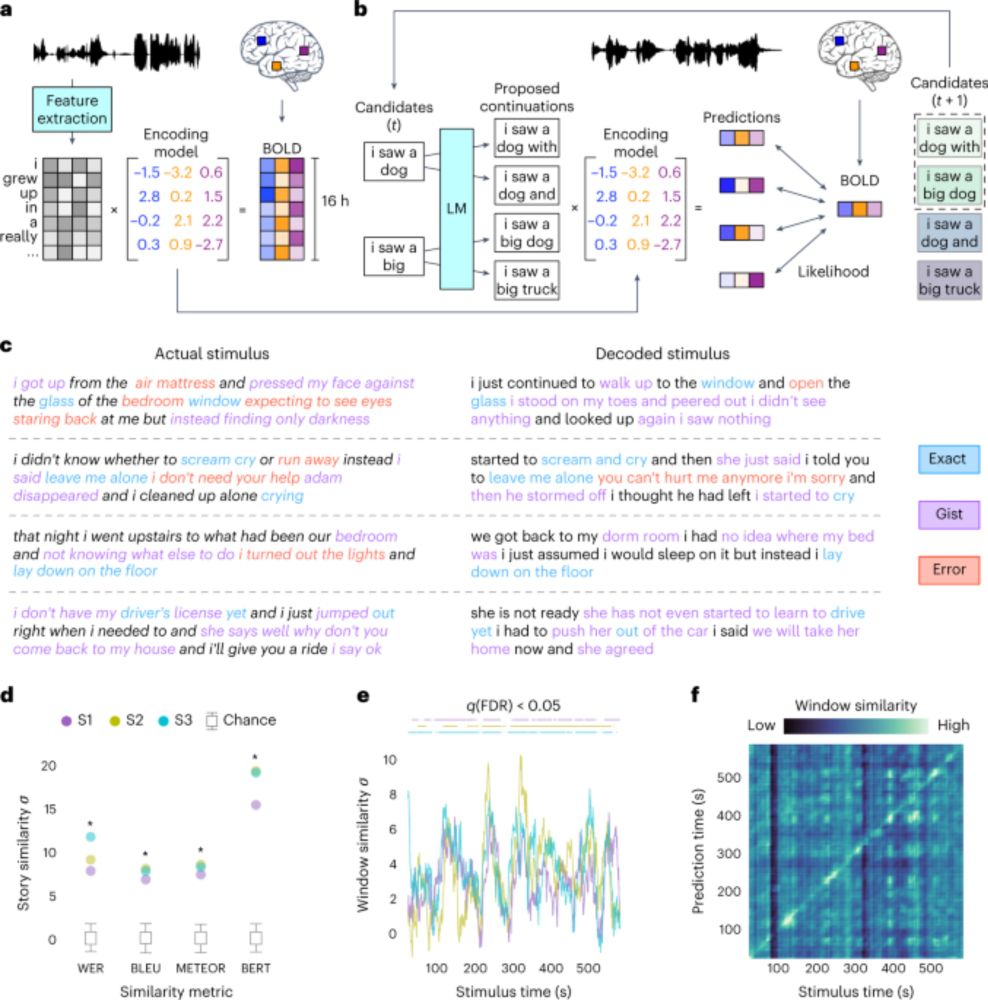
fMRI Data Analyst
University Overview The University of Pennsylvania, the largest private employer in Philadelphia, is a world-renowned leader in education, research, and innovation. This historic, Ivy League school co...
Regardless, we are excited to see where this road takes us in treating this vulnerable patient population. If you're interested in joining this collaborative effort (@gkaguirre.bsky.social), check out our job posting here!:
wd1.myworkdaysite.com/en-US/recrui...
18.02.2025 06:02 — 👍 0 🔁 0 💬 0 📌 0
Neurology® Journals
Neural decoding as a covert consciousness assessment is not without limitations. One cannot investigate another's consciousness without eventually falling into a philosophical rabbit hole. Read a thoughtful editorial about this piece here:
www.neurology.org/doi/10.1212/...
18.02.2025 06:02 — 👍 0 🔁 0 💬 1 📌 0
If feasible, the implications are numerous: A more granular tool that identifies a spectrum of covert consciousness. A more sensitive consciousness assessment that circumvents atypical functional neuroanatomy and limited interactivity. And potentially, a brain-computer interface.
18.02.2025 06:02 — 👍 0 🔁 0 💬 1 📌 0
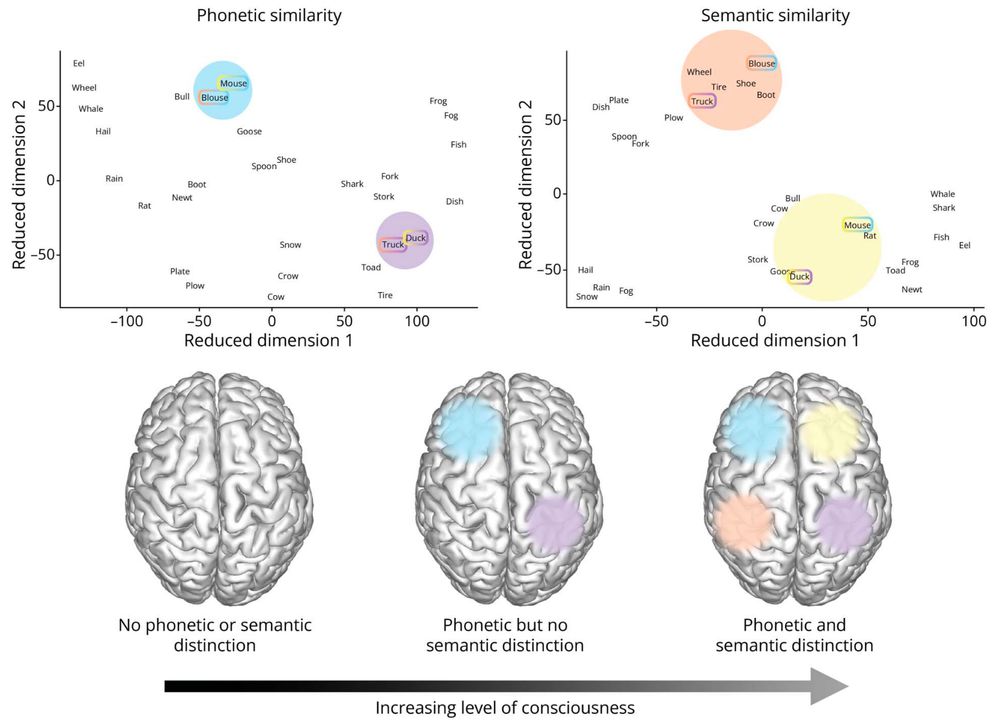
It would also allow us to evaluate consciousness not as an oversimplistic dichotomy, but as a continuous spectrum, based on the complexity of distinctions that can be decoded from the patient's brain activity.
18.02.2025 06:02 — 👍 0 🔁 0 💬 1 📌 0
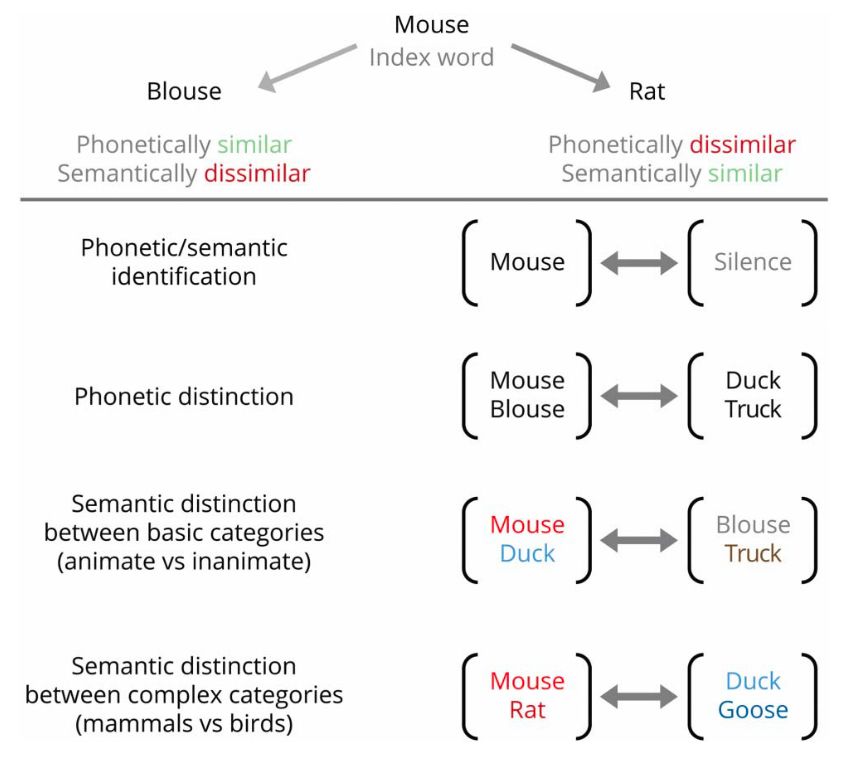
Neural decoding for covert consciousness is, in a sense, simpler than what's been done in healthy individuals. We don't need to reconstruct entire narratives (yet). We only need a paradigm to determine if patients can make basic semantic distinctions -- i.e., extract meaning.
18.02.2025 06:02 — 👍 0 🔁 0 💬 1 📌 0
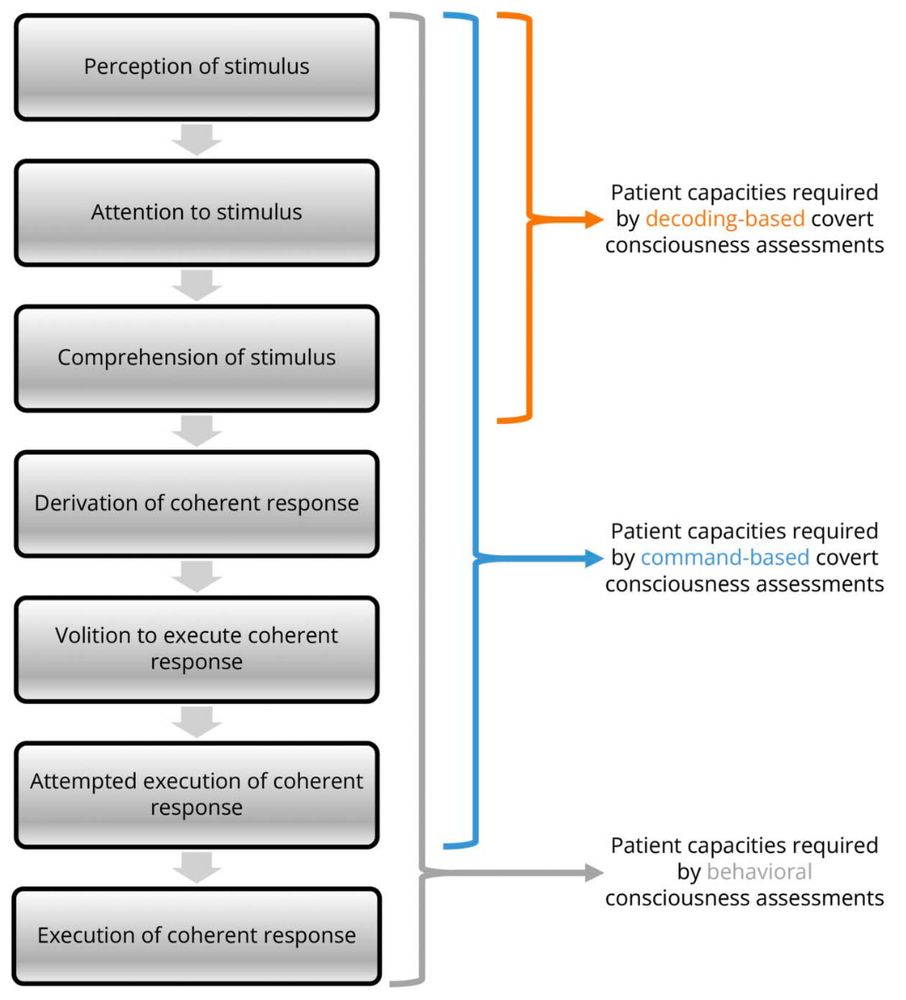
What if we used mind-reading to determine what minds were there in the first place? Neural decoding could solve a lot of problems. Unlike behavioral or traditional covert consciousness paradigms, it wouldn't require interaction or assumptions of functional neuroanatomy.
18.02.2025 06:02 — 👍 1 🔁 0 💬 1 📌 0
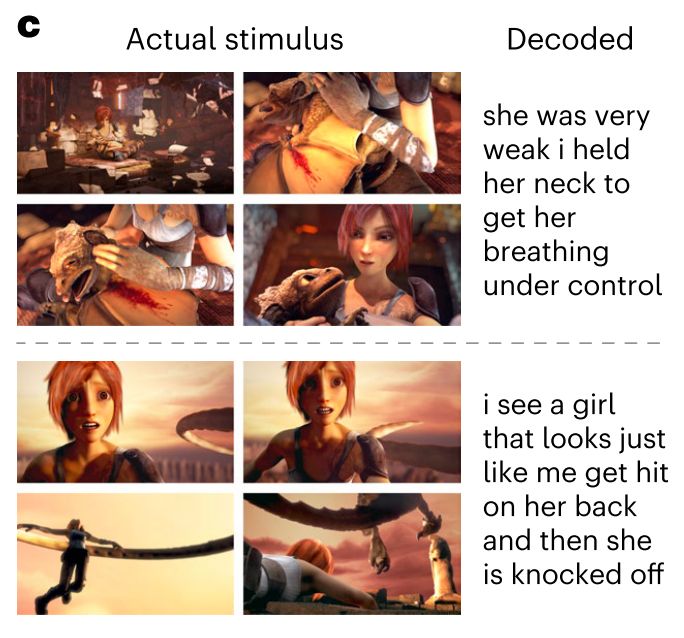
The narratives didn't need to be auditory. The algorithms could even decode narratives from muted movies. This is as close to mind-reading as we've ever come.
18.02.2025 06:02 — 👍 0 🔁 0 💬 1 📌 0
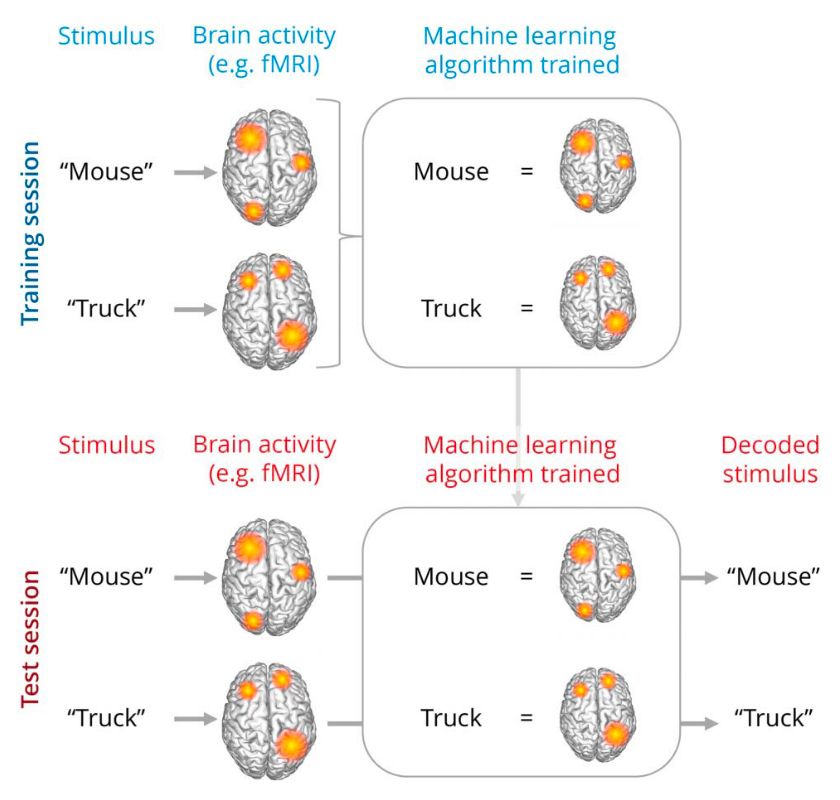
Neural decoding works like this: You train an algorithm to associate stimuli with patterns of brain activity, then use it to "decode" a person's experience from their brain activity. The stimulus can even be a semantic concept, so you can decode not only sensation, but *meaning*.
18.02.2025 06:02 — 👍 0 🔁 0 💬 1 📌 0
Thus, current fMRI covert consciousness paradigms may be neither sensitive nor specific. EEG-based paradigms solve some problems, but create others. We therefore may be making errors in who we consider conscious. Enter "neural decoding".
18.02.2025 06:02 — 👍 0 🔁 0 💬 1 📌 0
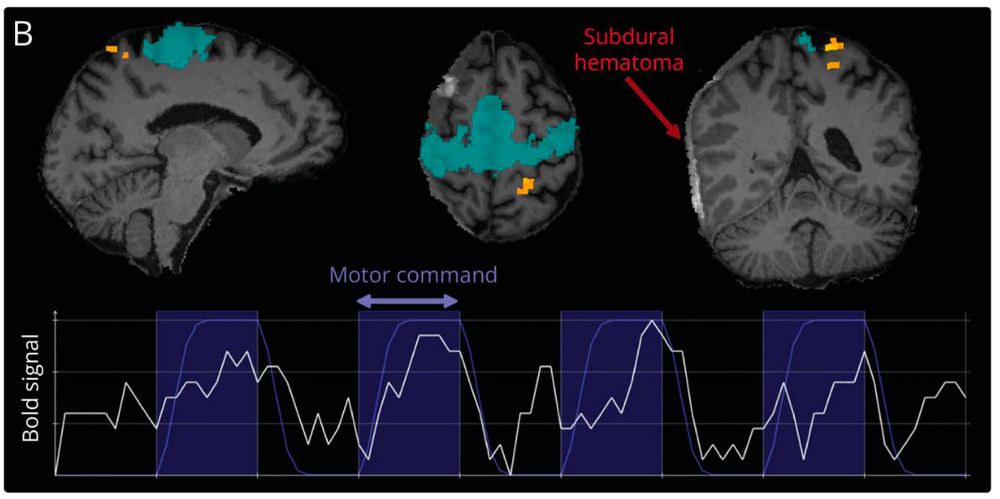
Conversely, what if there is distortion of the brain due to a lesion, and activity occurs outside of typical motor regions? Should we not count this (and risk overlooking consciousness patients)?
18.02.2025 06:02 — 👍 0 🔁 0 💬 1 📌 0

Many fMRI paradigms work like this: During a scan, we present alternating periods of commands (e.g., "move your hand") and rest. If there is activity in motor regions during commands (relative to rest), we conclude covert consciousness. But should we? Does slight overlap count?
18.02.2025 06:02 — 👍 0 🔁 0 💬 1 📌 0
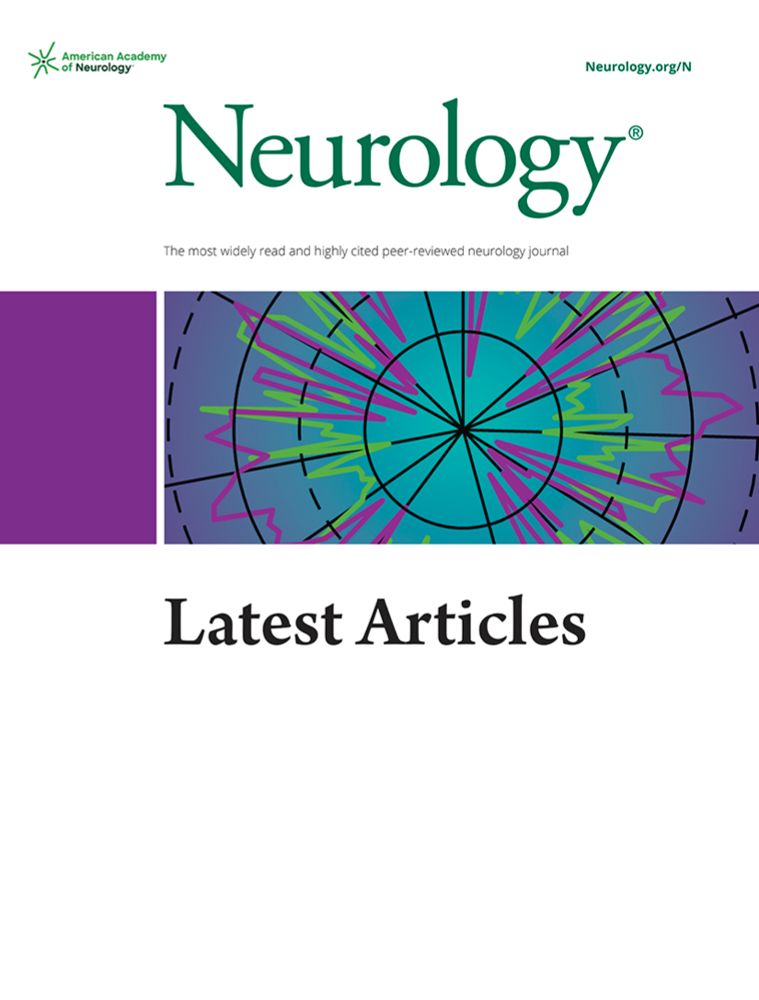
Reconstructing Covert Consciousness | Neurology
Determining the level of consciousness in patients with brain injury—and more fundamentally,
establishing what they can experience—is ethically and clinically impactful. Patient
behaviors may unreliab...
Covert consciousness, where unresponsive patients willfully modulate brain activity to command, is gaining attention. But these assessments are fundamentally limited. What if we could just... read their minds instead? 🧵 about our paper in
@greenjournal.bsky.social
www.neurology.org/doi/10.1212/...
18.02.2025 06:02 — 👍 1 🔁 1 💬 1 📌 0
I'm looking for a research specialist with experience in fMRI analysis to help with a project studying covert consciousness in unresponsive patients, in collaboration with @gkaguirre.bsky.social. Please message me or email me at David.Fischer@pennmedicine.upenn.edu if interested!
12.11.2024 10:38 — 👍 2 🔁 1 💬 1 📌 0
Neurointensivist, mother, daughter, sister, wife, public health advocate, sports fan. Tweets are my own views.
Neurointensivist @ Emory University | Cajalista | Coffee & Poems | Juijiteiro | Everything transitory - the knower and the known
🇨🇦 peds intensivist & neuro intensivist. McGill/CHOP-trained, 5 yrs @ CHUL and now back at McGill’s Montreal Children’s Hospital. #PedsICU #NeuroPICU
Neurointensivist. Canadian living in Pittsburgh. Trying to figure out how clinicians make decisions about neurologic prognostication.
I practice guitar, drawing, photography and neurocritical care; read constantly (not just journal articles!) and write. That’s Kittery in the photo by my wife.
🇨🇦 neurocrit and neuroanes, star gazer
Neurointensivist @ UMich | OHSU, UMich, and IUSM Alumnus | Interests in medical education, MMM, neurology of systemic disease, EBM. | https://www.ncc-ed.com | Views are my own.
Neurointensivist & neuroanaesthetist.
Clinical Lead neuroscience critical care @Queen Square. National Lead FUSIC Brain. Mother of 2 clever & beautiful girls (one PhD, one MBChB). #FUSIC 🧠
Neurointensivist, Neurologist, and Physician Scientist. Opinions my own.
Neurointensivist, TBI researcher, Chaos Coordinator for 3 small but mighty humans
Neurologist, Neurointensivist, Educator, Researcher, and AI-ML/Space enthusiast for advancing science for the greater good of civilization. https://linktr.ee/freemanwd
Neurocritical Care APP; POCUS nerd, professor, sport pilot, will speak publicly for food and travel 🤓
JNN promotes excellence, innovation, and leadership in patient care outcomes through the dissemination of evidence-based neuroscience nursing knowledge.
Neurointensivist, epileptologist, Rush University Medical Center
Pediatric Neurology, Pediatric Epilepsy, Neurohospitalist, Neurointensivist, Outcomes Research, EEG science, collaborative innovation with friends and colleagues. #PedQuEST #PNCRG #CHOP
Neurointensivist, translational scientist, teacher, husband and father.
Neuro ICU PharmD 💊
PGY2 Neuro Pharmacy Residency RPD 🧠
Grady Atlanta 🏥🚑
views are my own 🤓
#PharmFresh





